UCLA Philharmonia and HEAR NOW Chamber Concert
UCLA Herb Alpert School of Music
In Collaboration with HEAR NOW
Sunday April 28, 2024
Schoenberg Hall
4:00pm
Glen Whitehead, trumpet
Susan Grace, piano
Neal Stulberg, conductor
Samuel Chung, assistant conductor
Gan Xiong, assistant conductor
Performers

UCLA Philharmonia
See RosterViolin 1
Sean Takada (concertmaster)
Rebecca Beerstein*
Ally Cho*
Johannes Eberhart*
Janice Hu
Kayla Lee
Alisa Luera*
Sophia Shih
Kelly Tsai
Isaac Visoutsy
Joce Wang
*= string quartet player
Violin 2
Rubani Chugh (principal)
Mattin Aframian
Jason Chen
Alex Collins
Honor Frisco
Jimin Koo
Nathan Robinson
Bertrand Stone
Mana Tatsuki
Erin Tsui
Jerimiah Youngblood
Viola
Damon Zavala (principal)
Ian Lee
Ellen Lozada*
Jocelyn Pon
James Renk
Layla Shapouri*
Daniel Oviedo
*=string quartet player
Cello
Isabelle Fromme (principal)
Peter Walsh (principal)
Leon Cho
Sarah Clark
Isaac Fromme
Jasmine Lam
Edward Li
Annabelle Lo
Naohiro Nadahara*
Kaya Ralls
Dylan Renk*
Aerie Walker
Aidan Woodruff
*=string quartet player
Double Bass
Skyler Lee (principal)
Zack Hauser
Dawson Lam
Luka Lesko
Leon Simmans
Atticus Simmons
Flute
Katlyn Lang*
John Robert Santiago
Shannyn Sul*
*=piccolo
Oboe
Emma Crawford
Adam Frary*
Tina Shigeyama
*=English Horn
Clarinet
Shiun Choi
Jacob Freiman*
Harrison Garff
Jonathan Recomanta
Yijin Wang
*=Bass Clarinet
Bassoon
Davis Lerner*
Adam Moss
Dani Santana*
*=Contrabassoon
Trumpet
Olivia Achcet
Remy Ohara
Saul Gutierrez-Sandoval
Nick Washburn
Horn
Bryan Chiu
Vincent Jurado
Hannah Lee
Rory O’Regan
Aziel Ressler
Tenor Trombone
Spencer Mar
Gregory Ochotorena
Bass Trombone
Carlos Castaneda
Tuba
Daler Babaev
Errol Rhoden
Percussion
Kevin Needham (principal)
Demitrius Alleyne
Alejandro Barajas
Kobe Sanders
Audrey Sherill
Harp
Jillian Risigari Gai Lopez
Piano
Isabelle Ragsac
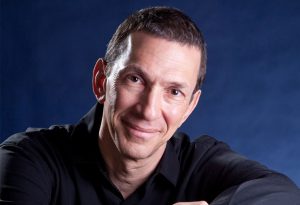
Neal Stulberg
See BioHeralded by the Los Angeles Times as “. . .a shining example of podium authority and musical enlightenment,” Neal Stulberg has garnered consistent international acclaim for performances of clarity, insight and conviction. Since 2005, he has served as Director of Orchestral Studies at the UCLA Herb Alpert School of Music. From 2014 to 2018, he served as Chair of the UCLA Department of Music.
In North America, Mr. Stulberg has led the Philadelphia Orchestra, Los Angeles Philharmonic, Atlanta, Fort Worth, Houston, Indianapolis, Milwaukee, Mexico City, National, New Jersey, New World, Oregon, Pacific, Phoenix, Saint Louis, San Antonio, San Francisco, Utah and Vancouver symphonies, St. Paul Chamber Orchestra and Los Angeles Chamber Orchestra, and New York City Ballet and San Francisco Ballet. A former assistant conductor of the Los Angeles Philharmonic under Carlo Maria Giulini and music director of the New Mexico Symphony Orchestra, he is a recipient of the Seaver/National Endowment for the Arts Conductors Award.
Mr. Stulberg’s European appearances have included performances in Germany with the WDR Rundfunkorchester Köln and the orchestras of Augsburg, Bochum, Dortmund, Freiburg, Herford, Jena, Münster, Nürnberg, Oldenburg and Rostock. In Holland, he has conducted the Netherlands Radio Symphony Orchestra at the Amsterdam Concertgebouw and led the Netherlands Ballet Orchestra, Netherlands Radio Chamber Orchestra, North Holland Philharmonic, Gelders Orchestra and Nieuw Sinfonietta Amsterdam. He has also appeared as guest conductor with the Stavanger Symphony Orchestra (Norway), Warsaw Chamber Orchestra, Klaipeda Chamber Orchestra (Lithuania), Athens State Orchestra, London Royal Ballet Sinfonia, Barcelona Liceu Orchestra and Norwegian National Opera Orchestra.
International engagements have also included the St. Petersburg Symphony Orchestra, Moscow Chamber Orchestra, Hong Kong Philharmonic, Taipei Symphony Orchestra, Seoul Philharmonic, Korea Philharmonic (KBS), Queensland, Adelaide and West Australian symphonies, Haifa Symphony Orchestra, Israel Sinfonietta and Ra’anana Symphonette.
An acclaimed pianist, Stulberg has appeared as recitalist, chamber musician and with major orchestras and at international festivals as pianist/conductor. His performances of Mozart concertos conducted from the keyboard are uniformly praised for their buoyant virtuosity and interpretive vigor. In 2011-12, he performed the complete Mozart sonatas for violin and piano with violinist Guillaume Sutre at UCLA’s Schoenberg Hall and at the Grandes Heures de Saint Emilion festival in France. In 2018, he performed throughout South Africa on a recital tour with saxophonist Douglas Masek and in 2022, appeared as solo pianist in the world premiere of Inclusion, a new work for pianist and chamber orchestra by Hugh Levick.
Mr. Stulberg has conducted premieres of works by Paul Chihara, Mohammed Fairouz, Jan Friedlin, William Kraft, Alexander Krein, Betty Olivero, Steve Reich, Peter Schat, Lalo Schifrin, Dmitri Smirnov, Earl Stewart, Morton Subotnick, Joan Tower and Peter van Onna, among others, and has also led works by UCLA composers Münir Beken, Bruce Broughton, Kenny Burrell, Mark Carlson, Ian Krouse, David Lefkowitz and James Newton. He conducted the period-instrument orchestra Philharmonia Baroque in a festival of Mozart orchestral and operatic works, and has brought to life several silent movies from the early 1900s, including the Russian classic New Babylon, Shostakovich’s first film score. In August 2022, he conducted the North American premiere of Bas-Sheve, a recently rediscovered and orchestrated 1924 Yiddish-language opera by composer Henekh Kon and librettist Moishe Broderzon, at the Ashkenaz Festival in Toronto. In 2023, Stulberg led acclaimed performances of Dave Brubeck’s cantata, The Gates of Justice (1969) and the West Coast premiere of Lera Auerbach’s Symphony No. 6 (Vessels of Light) (2022) as part of the School of Music’s Music and Justice series, presented in collaboration with the Lowell Milken Center for Music of American Jewish Experience.
Collaborators have included John Adams; Leonard Bernstein; Chris, Dan and Darius Brubeck; Dee Dee Bridgewater; John Clayton; Mercer Ellington; Michael Feinstein; Philip Glass; Morton Gould; David Krakauer; Lar Lubovitch; Peter Martins; Mark Morris; Angel Romero; Cornel West; and Christopher Wheeldon. He has conducted Philip Glass’ opera Akhnaten at the Rotterdam Festival and Thomas Adès’ Powder Her Face with Long Beach Opera in Los Angeles, and has recorded for Naxos, West German Radio, Donemus, Yarlung Records, Sono Luminus and the Composers Voice label.
Mr. Stulberg has maintained a career-long passion for the training of young musicians. He has conducted and taught at the New World Symphony, Indiana University Summer Institute, Juilliard School, New England Conservatory, New Zealand School of Music, Henry Mancini Institute, Los Angeles Philharmonic Summer Institute, National Repertory Orchestra, Interlochen Arts Academy, American-Russian Youth Orchestra, Turkish Music State Conservatory (Istanbul), National Conservatory of Belarus (Minsk), Central Conservatory of Music (Beijing), Capitol Normal University (Beijing), Shanghai Conservatory of Music and National Taiwan Normal University. In December 2019, he taught and lectured in Israel at the Buchmann-Mehta School of Music, Jerusalem Academy of Music and Dance and Haifa University and returns to conduct its symphony orchestra in June 2024.
A native of Detroit, Mr. Stulberg is a graduate of Harvard College, the University of Michigan and the Juilliard School. He studied conducting with Franco Ferrara at the Accademia Nazionale di Santa Cecilia in Rome, piano with Leonard Shure, Theodore Lettvin, William Masselos and Mischa Kottler, and viola with Ara Zerounian.
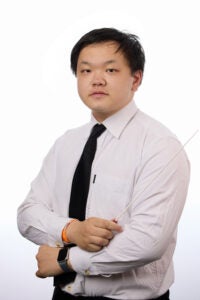
Chinese-born conductor Gan Xiong has led orchestras including the Case Western Reserve University Orchestra (Cleveland, OH), Tokyo Sinfonia, UCLA Symphony, Miami Music Festival Orchestra, and Bacâu Philharmonic Orchestra (Romania), and has conducted student productions of musicals including “The Mystery of Edwin Drood” and “Dear Evan Hansen.” He has led youth orchestras in Shanghai including the Huangpu District Youth Orchestra and Shanghai Kite Youth Orchestra, where he served as faculty in a Baroque summer camp session and conducted its final concert in 2019.
Also a vocalist, Gan was a member of the Tanglewood Festival Chorus from 2021 to 2022, where he participated in a recording of Shostakovich Symphony No. 3 with the Boston Symphony Orchestra.
He holds a Bachelor’s Degree in vocal performance from Case Western Reserve University and a Master’s Degree in orchestral conducting from The Boston Conservatory at Berklee. His teachers have included Kathleen Horvath, Bruce Hangen, Charles Gambetta, and Ovidiu Balan; he has participated in masterclasses with Mark Gibson, Arthur Fagen, Apo Hsu, Robert Ryker, and John Farrer. He currently pursues a DMA degree in orchestral conducting at the UCLA Herb Alpert School of Music, studying with Neal Stulberg.
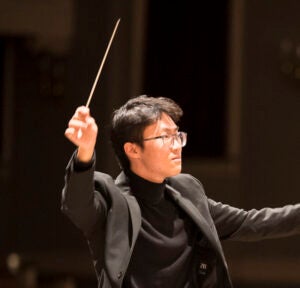
Samuel Chung is an orchestral conducting major in the Masters program at UCLA, studying with Neal Stulberg and leading its ensembles, including UCLA Symphony, UCLA Philharmonia, and uclaFLUX.
He holds a Bachelor’s degree from Boston University, where his primary teachers were Lucia Lin and Jeremy Yudkin. At B.U., he was conductor of Time’s Arrow, the school’s contemporary music ensemble, and also studied with Joshua Rifkin, Steven Ansell, Peter Zazofsky and others. He received a Boston University College of Fine Arts Scholarship in violin performance and its 2023 Departmental Award in Musicology and Ethnomusicology.
As founder and artistic director of the Magari Ensemble, Chung has collaborated on interdisciplinary projects with organizations such as New England Conservatory’s Blind Glass Ensemble and Schönberg Center Vienna.
In recent summers, Chung studied with Gerard Schwarz as a Conducting Scholar at the Eastern Music Festival and was in residence at the 2023 Montecito International Music Festival as conductor of the festival orchestra. He has also assisted and prepared ensembles for conductors including Paul Phillips (Stanford University) and Larry Livingston (USC Thornton). In 2023, Chung was named Finalist of The Respighi Prize in Conducting, issued by the Chamber Orchestra of New York and Comune di Bologna (Italy).

GLEN WHITEHEAD, D.M.A. As a trumpet artist Whitehead’s background includes international appearances as a solo artist along with the EcoSono Ensemble, Wai, Psychoangelo, the Bottesini Ensemble, Nexus Brass and more. He has composed for professional theatre and dance, most notably in several projects with the Ormao Dance Co. He’sc ommissioned works from the world’s finest composers including concertos by Matthew Burtner with Grammy Award winner, trumpeter Cuong Vu and Dr. George E. Lewis.
He released the Ecoacoustic solo recording Pale Blue on Neuma Records in Spring 2023 to rave reviews and international airplay. His recording, “the Living Daylights” (2018) on pfMENTUM remained on the top 10 of radio playlists across the U.S. for over a year. With Michael Theodore, Psychoangelo’s release panauromni was listed on the top ten cd’s by Chicago Time Out. He recorded two cd’s with O’Keefe / Stanyek / Walton / Whitehead –“Tunnel” and “Unbalancing Acts” on Circumvention and 9Winds Records, performed solo trumpet on the opera “Tania” by Anthony Davis on Kotch Int, and was principal trumpet on the soundtrack for the video game, Everquest.
As an interdisciplinary sound artist Whitehead explores the intersection between science and music in ecoacoustics, improvisational phenomena, interactive communication and environmental collaboration between living cultures, technologies and the natural world.
Whitehead is a Professor of Music, Chair of the Department of Visual and Performing Arts, and Co- Director of the Bachelor of Innovation degree at the University of Colorado, Colorado Springs. Whitehead received his Bmus in Performance at the New England Conservatory of Music, and M.A. and D.M.A from the University of California, San Diego.
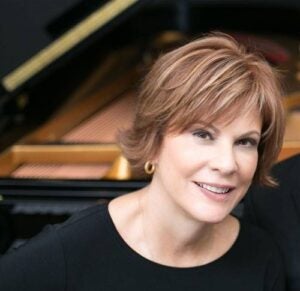
Grammy-nominated pianist and Steinway Artist SUSAN GRACE is associate chair, artist-in-residence, and senior lecturer at Colorado College. Grace was awarded the 2020 Gresham Riley Award, the Alumni Associations’ highest honor for service to Colorado College, and the 2023 Jane Cauvel Cultivating Collaboration and Community Presidential Leadership Award. Grace is music director of the renowned Colorado College Summer Music Festival, now in its 40th season.
Grace records for Bridge Records. She is a member of Quattro Mani, an internationally acclaimed two-piano ensemble with New York pianist, Steven Beck. Bridge Records recently released two new CDs by Quattro Mani, featuring American composer Fred Lerdahl and another including American and European composers. Giorgio Koukl’s EarRelevant review of their latest CD, Hallelujah Junction says “..their incredible array of capacities is strong enough to place them precisely on the top of the piano duos of today.” Fanfare’s Carl Roberts writes that “Quattro Mani is one of the most enduring and leading keyboard duos anywhere” and the Boston Globe printed “Quattro Mani proved itself fearless and equal to every challenge.”

Rich and powerful musical language and a strong sense of drama have made Scottish-American composer THEA MUSGRAVE one of the most respected and exciting contemporary composers in the Western world. Her works are performed in major concert halls, festivals, and radio stations on both sides of the Atlantic. Known for the clarity of her invention, the skill of her orchestrations, and the power of her musical communication, Musgrave has consistently explored new means of projecting essentially dramatic situations in her music. Frequently altering and extending the conventional boundaries of instrumental performance by physicalizing their musical and dramatic impact: both without programmatic content and others with specific programmatic ideas including the famous Greek legends in Orfeo, Narcissus, Helios, and Voices from the Ancient World; – all extensions of concerto principles. In some of these, to enhance the dramatic effect, the sonic possibilities of spatial acoustics have been incorporated.
Her ten large-scale and several chamber operas of the past 40 years beginning with The Voice of Ariadne (1972) and followed by Mary, Queen of Scots (1977), A Christmas Carol (1979), Harriet, The Woman Called Moses (1984), Simón Bolivar (1992), Pontalba (2003) are in every sense the true successors to these instrumental concertos. Two major retrospectives in recent years have shown the immense diversity of her music: the BBC’s Total Immersion weekend in 2014 and the Stockholm International Composer Festival 2018, in which fifteen of her orchestral and chamber works in four concerts- the largest profile of her music to date.
Musgrave has been featured at many other major festivals including Edinburgh, Warsaw Autumn, Florence Maggio Musicale, Venice Biennale, Aldeburgh, Cheltenham and Zagreb. Musgrave has been the recipient of many notable awards including two Guggenheim Fellowships, the Ivors Classical Music Award 2018, and The Queen’s Medal for Music. She was awarded a CBE on the Queen’s New Year’s Honour List in 2002.
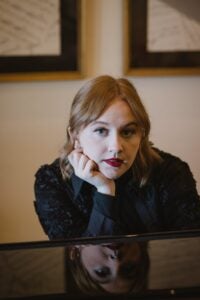
The music of ELLA KAALE [Kah-lee] (b. 2003) is perpetually chasing cathartic release, characterized by collagism, abstraction, and polarity. Kaale is an alumna of Carnegie Hall’s National Youth Orchestra of the United States of America’s Composer Apprenticeship, where she was mentored by Sean Shepherd. Her music has been performed by the USC Thornton Symphony, TAK Ensemble, CORVUS, Hub New Music, Pacific Chamber Orchestra, Dolce Suono Ensemble, the New York Youth Symphony Jazz Ensemble, the Bergamot Quartet, Schroeder Umansky Duo, harpist Bridget Kibbey, and flautist Mimi Stillman. Her honors include a Semi-Finalist for the American Composers Orchestra EarShot Readings with ROCO, Most Valuable Player for the USC Composition Department, a YoungArts Merit Award, a Luna Composition Lab Honorable Mention, the Texas Music Scholar Award, the American Festival for the Arts Composition Faculty Excellence Award, the Parent-Teacher Association Reflections Fine Arts Competition National Award of Excellence, and an Honorable Mention for the NextNotes High School Music Creator Award. Additionally, Kaale is a composition Teaching Artist Assistant with the Los Angeles Chamber Orchestra (LACO) Meet the Music program. She is currently a junior in the B.M. Composition program at the University of Southern California Thornton School of Music, studying with Christopher Trapani, Ted Hearne, and Andrew Norman.
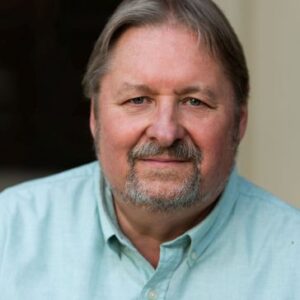
JACK VAN ZANDT (b. 1954) is a Grammy-winning composer of music for concerts, film and TV, and a music educator and writer. He is based in Los Angeles and Ireland. He attended UC Santa Barbara’s College of Creative Studies and Cambridge University, and studied composition with Alexander Goehr, Thea Musgrave, Peter Maxwell Davies and Peter Racine Fricker. He was recently a music faculty member at the University of Colorado, Colorado Springs, and California Institute for the Arts (CalArts). He is a new music concert producer in Los Angeles, and a founder and co-director with Anne LeBaron of the Beyond Opera Collective. His music is published by Composers Edition in Oxford, U.K. His book with Alexander Goehr, Composing a Life: Teachers, Mentors and Models, was published by Carcanet in December 2023
More information at www.jackvanzandt.com or composersedition.com/jack-van-zandt/

“Radiant and transcendent”, the music of JUHI BANSAL weaves together themes celebrating musical and cultural diversity, nature and the environment, and strong female role models. Her music draws upon elements as disparate as progressive metal, Hindustani music, spectralism, sound design and choral traditions to create deeply expressive, evocative sound-worlds. As an Indian composer brought up in Hong Kong, her work draws subtly upon both those traditions, entwining them closely and intricately with the gestures of western classical music.
Recent projects include Love, Loss and Exile, a song cycle on poetry by Afghan women commissioned by Songfest; Songs from the Deep, a new orchestral work inspired by humpback whale songs commissioned by the Oregon Mozart Players; Waves of Change, a digital experience on womanhood, identity and clash of cultures inspired by the story of the Bangladesh Girls Surf Club; and Edge of a Dream, an opera about Ada Lovelace, daughter of infamous poet Lord Byron and a 19th Century pioneer in computing commissioned by Los Angeles Opera. Recent seasons have included commissions from the Los Angeles Philharmonic Association, Beth Morrison Projects, the New York Virtuoso Singers, Heidi Duckler Dance Theatre, the Oakland East Bay Symphony, AIDS Quilt Songbook 20th Anniversary project and more. Her music is regularly performed throughout the U.S., Europe and Asia and available on the Naxos, Albany and Roven Records labels.
juhibansal.com

AKARI KOMURA (b.1996) is a Japanese composer-vocalist. She grew up in Tokyo and spent her teenage years in Jakarta, Indonesia. From an early age, Akari has been involved in performing arts through playing the piano, singing, and dancing modern ballet. Her interest in somatic practice and embodied consciousness is central to her creative process. Akari imagines her score as an invitation for the performers to contemplatively engage with listening and soundmaking. She is interested in curating a participatory performance space that invites a community of performers and audience for a collective and ritualistic act of listening and soundmaking. Akari’s artistic exploration is oriented towards heightening awareness and transforming our perception of the sonic environment. The works of Pauline Oliveros, Yoko Ono, and Hildegard Westerkamp are especially influential to her creative process. Her breadth of work spans chamber ensemble, multimedia electronics, and interdisciplinary collaborations with dancers, visual artists, and architects.
Akari’s works have been presented at the Atlantic Music Festival, Composers Conference, International Composition Institute of Thailand, New Music Gathering, Nief-Norf, MATA Festival, Montreal Contemporary Music Lab (Canada), Penn State New Music Festival, soundSCAPE (Italy), soundpedro, and VU Symposium.
Recent highlights include receiving a commission by the Kinds of Kings as a 2020 Bouman Composer Fellow and premiered by the Rubiks Collective. In 2023 spring, Akari was selected by American Composers Orchestra EarShot Reading to work with The Next Festival of Emerging Artists on a new string orchestra piece, Inhabited by air.
Akari holds an M.M. in Composition from the University of Michigan (recipient of the EXCEL Enterprise Fund and Sonic Scenographies Research Grant) and a B.A. in Vocal Arts from the University of California, Irvine. Akari is currently a Ph.D. composition student at the University of California San Diego.
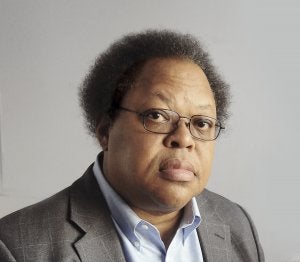
GEORGE LEWIS is an American composer, musicologist, and trombonist. He is Edwin H. Case Professor of American Music and Area Chair in Composition at Columbia University, and Artistic Director of the International Contemporary Ensemble. A Fellow of the American Academy of Arts and Sciences and the American Academy of Arts and Letters, a Corresponding Fellow of the British Academy, and a member of the Akademie der Künste Berlin, Lewis’s other honors include the Doris Duke Artist Award (2019), a MacArthur Fellowship (2002), and a Guggenheim Fellowship (2015). A member of the Association for the Advancement of Creative Musicians (AACM) since 1971, Lewis’s work is presented by ensembles worldwide, published by Edition Peters. A Yamaha Artist, Lewis is widely regarded as a pioneer in the creation of computer programs that improvise in concert with human musicians.
His widely acclaimed book, A Power Stronger Than Itself: The AACM and American Experimental Music (University of Chicago Press, 2008) received the American Book Award and the American Musicological Society’s Music in American Culture Award. Lewis is the co-editor (with Harald Kisiedu) of the bilingual edited volume Composing While Black: Afrodiasporic New Music Today/Afrodiasporische Neue Musik Heute (2023), as well as (with Benjamin Piekut) the two-volume Oxford Handbook of Critical Improvisation Studies (2016). Lewis holds honorary doctorates from the University of Edinburgh, Harvard University, the University of Pennsylvania, Oberlin College, the School of the Art Institute of Chicago, New England Conservatory, New College of Florida, and Birmingham City University, among others.
Repertoire
Thea Musgrave
Orfeo V: Orfeo ed Euridice (1975, rev 2019)
World Premiere
J.R. Santiago, flute 1 (Orfeo)
Katlyn Lang, flute 2 (Euridice)
Neal Stulberg, conductor
Ella Kaale
seawall blvd (2022-23)
Gan Xiong, conductor
Jack Van Zandt
From th’ Ethereal Skie (2015)
World Premiere
Neal Stulberg, conductor
Intermission
Juhi Bansal
Songs from the Deep (2022)
Los Angeles Premiere
Neal Stulberg, conductor
Akari Komura
Inhabited by air (2023)
West Coast Premiere
Samuel Chung, conductor
George Lewis
Lonnie and Lonie (2019)
Los Angeles Premiere
Glen Whitehead, trumpet*
Susan Grace, piano*
Neal Stulberg, conductor
*guest artist
Donor Acknowledgement
This event is made possible by the David and Irmgard Dobrow Fund. Classical music was a passion of the Dobrows, who established a generous endowment at The UCLA Herb Alpert School of Music to make programs like this possible. We are proud to celebrate this program as part of the 2023 – 24 Dobrow Series.
Program Notes
THEA MUSGRAVE: ORFEO V:
Orfeo ed Euridice
This work was originally commissioned by the BBC for James Galway, as a work for solo flute and tape (Orfeo 1): All the music on the tape would be an electronically treated recording of James Galway playing a variety of different flutes. It was first performed by him in this version in 1976. Shortly after, another version (Orfeo Il) was written where all the music on the tape was distributed amongst 15 strings.
This work is intended as a simple retelling of the famous legend. The flute represents Orfeo; all the other elements and characters in the story are represented by the music for the strings. Orfeo’s journey to the underworld exists only in his imagination. To heighten the effect of this separation of reality and imagination, much of the music of Euridice, the Furies, the Shades, is suggested by “memory elements” that is, quotations from the Orfeo of Gluck. They are woven into the fabric of the music. The whole work is thus focussed on Orfeo; on his mourning for Euridice and his vain attempts to recover her. In the end he has to resign himself to her loss.
in 2019, I was asked to write Orfeo V for William Bennett (known as WIBB) …but sadly he died so it was never performed. Orfeo V is an arrangement of Orfeo II: here a second flute is added who enacts the part of Euridice.
ELLA KAALE: seawall blvd
I grew up on the Texas Gulf Coast, between Nassau Bay and Galveston Island. The water is muddy-brown, the sand is coarse and sticky, and the beach annually houses miles of washed-up seaweed that smells terrible and attracts flies. Why are people so obsessed with the beach? Like, why is this such a hub of American culture? Why do songs about the beach dominate the pop music industry? The beach sucks! My first year living in Southern
California, I went to Santa Monica on a class field trip and instantly
realized, oh, this is why people are so obsessed with the beach.
But what does Galveston have that none of these paradises have? The Seawall Boulevard.
Galveston is a barrier island, a natural (albeit pretty ineffective) defense against hurricanes. The Seawall lives up to its name— it’s a man-made enhancement to the barrier structure; a 17-foot concrete wall emerging from the beachfront, with Galveston’s busiest tourist hotspot resting atop it. The Seawall and its beaches have been home to countless memories of my lifetime, and crucial moments in my relationships that shaped me into the person I am today.
I originally wrote this piece (for chamber orchestra) with the title “chrysaora”, referring to a genus of jellyfish called sea nettles. I wanted the piece to be a summation of my hyper-romantic experiences with the Pacific Ocean. In hindsight, I realize what I wrote has nothing to do with the Pacific. I listen to the piece, and I think about the Seawall, the Spirit Airlines of beachfronts, the beach I grew up with, a place where I kissed and played and cried. With this reimagining of “chrysaora”, I have decided to embrace the true subconscious inspiration that guided the original.
The chamber orchestra version of this piece was selected for Pacific Chamber Orchestra’s 2022 Dream American Workshop. The full orchestra version was premiered by the USC Thornton Symphony, conducted by Donald Crockett at the annual New Music for Orchestra concert.
JACK VAN ZANDT:
From th’ Ethereal Skie
For orchestra
An Imaginary Ballet after John Milton:
Eve and the Serpent in Paradise
The piece imagines the Biblical scene where Satan, disguised as a serpent, entices Eve to pluck the forbidden fruit. The composer was inspired by the following passage from John Milton’s Paradise Lost.
Of man’s first disobedience,
and the fruit
Of that forbidden Tree,
whose mortal taste
Brought death unto the world,
with all our woe,
With loss of Eden…
say first what cause
Moved our grand parents
in that happy state
Favor’d of Heav’n so highly,
to fall off
From their Creator,
and transgress His will
For one restraint,
lords of the world besides?
Who first seduc’d them
to that foul revolt?
Th’ infernal Serpent;
he it was, whose guile
Stir’d up with Envy and Revenge,
deceiv’d
The Mother of Mankind,
what time his Pride
Had cast him out from Heav’n,
with all his Host
Of Rebel Angels,
by whose aid aspiring
To set himself in Glory
above his Peers,
He trusted to have equal’d
the most High,
If he oppos’d;
and with ambitious aim
Against the Throne and
Monarchy of God
Rais’d impious War in Heav’n and
Battel proud
With vain attempt.
Him the Almighty Power
Hurld headlong flaming
from th’ Ethereal Skie
With hideous ruine and
combustion down
To bottomless perdition,
there to dwell
In Adamantine Chains and
penal Fire,
Who durst defie th’
Omnipotent to Arms.
JUHI BANSAL: Songs from the Deep
Jacques Cousteau wrote of finding freedom below the ocean’s surface, and I would add that one might find inspiration there as well. Below the waves lies a world that is both surreal and familiar, a place of transcendent calm, of weightlessness, of motion and stasis juxtaposed. Sounds underwater become physical – vibrations felt as much as heard – and as in the lapping of waves, gentle chatter from reefs, and sounds of wildlife, the lines between movement, noise, sound and music start to blur.
Inspired by an experience hearing humpback whale songs while diving, Songs from the Deep pays homage to an immersive soundscape of water, movement, current and flow; of changing colors and shifting light; of wild voices emerging out of chaos.
Commissioned by the Oregon Mozart Players for the 2022 Sound Investment Commission.
AKARI KOMURA: Inhabited by air
Inhabited by air invites both the listeners and musicians to connect with the subtle momentum of air behind each inhalation and exhalation. Emerging out of the breath, the piece journeys into invisible, transparent, and light qualities of air. How is your body wreathed in the air? How does air encircle your breaths? How does air inhabit your body? How does an exhale entwine with a breeze? This piece calls for an embodiment of the whirling energy of air enacted by the players’ breathing vocal bodies.
GEORGE LEWIS: Lonnie and Lonie
This work was inspired by my twin uncles, Lonnie and Lonie Griffith, who as teenagers were frequently tasked with watching over me while my parents were at work on weekends. We would go to horror movies like Mr. Sardonicus, where the director himself calls for a vote on whether the title character should suffer or escape the consequences of his depredations. Later, at the now-defunct Illinois Slag and Ballast Company, where Lonnie and Lonie were supervisors, they got me a job cleaning out railroad cars during a particularly intense Chicago winter.
Lonnie and Lonie expressed both complementary and contrasting views of the world, a circumstance that, in line with my general understanding of the important trope of depiction in American music (Ives, Ellington, and Carter, for examples), is perfectly suited to the deployment of the concerto form, which has offered composers the opportunity to enact both agonistic and cooperative dramaturgical experiences of the dialogue among soloist(s) and orchestra. I’d like to provide this small hint to you automobile buffs out there as to which soloist represents “Lonnie” and which “Lonie”: I remember when both were driving “muscle cars”–a Dodge Charger (Lonnie) and an SS396 Chevrolet Chevelle (Lonie). In the concluding double cadenza, the soloists, driving fast and noisily through the narrower streets of Chicago’s Englewood district, head each other off at the pass before the work’s emphatic, but somehow pensive conclusion.
This work is dedicated to Lonnie Griffith (1947-) and the memory of Lonie Griffith (1947-2002). I would like to thank Glen Whitehead, Susan Grace, Maestro Thomas Wilson, and the Chamber Orchestra of the Springs for bringing this project to full fruition.

